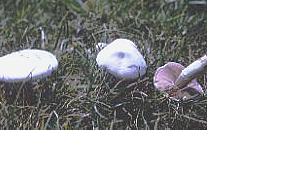By Country Boy
My Father was known as the Romney Marsh Mushroom King for, each year, he would send up to London, one or more tonnes of mushrooms. This was before the days of plentiful, cultivated ones. His season started in the spring, when the Jersey Island potatoes and tomatoes started to hit the streets. They were transported here in large, light, wooden boat-type baskets. He collected them up from the shops in the towns around, while on his daily trips to buy rags, bones and the precious rabbit skins. He would have vans on the road five days a week, covering southeast England. He would stack them in piles, one inside the other.
Then, in the autumn, he ventured onto the marsh to see all his gatherers. The sheep were the life of Romney Marsh then, before the plough. The people who looked after them, lived in houses miles from the main roads; a very lonely life for many women. The men were out all the time. The women did not go out to work in offices or shops; they looked after the house and kids. But, come mushrooming time, they could earn what was a fortune to them. Their husbands, being out in the fields all day, knew where the mushrooms were growing. So Father took a number of empty baskets to each house,. A few days later Dad returned with a pair of stillards (steelyards), a type of hand-held scales. Knowing the weight of an empty basket, he weighed the gathered crop, paying the grateful women the pre-arranged price in cash, there and then. At the start and end of the season us boys went with Dad to open and shut the gates. But, when things were in full swing, two vans went and there was no room for us; the driver had to open and shut his own gates.
I have seen Dad pull in the yard at the back of the house with a five cwt van, down on its springs with an old gate tied in to the back, sticking out eight feet, to make more room, stacked up with baskets. The wings of the van would have a couple of baskets tied to them also. It was just a lump of mushroom on the move! At times like this it was all hands to the pump. Long trestle tables were erected across the yard and a single light bulb hung from the washing line and, at times, a Tilly lamp was in use. All the mushrooms, (some were over twelve inches across and had to be cut in half), were then packed into four pound chip baskets like today, only then they were made of very thin wood. The same patterned handle and cardboard top as today, was carefully squeezed on and a label tied to the handle. They were weighed and the weight was recorded. They were stacked onto the lorry for the mad rush to catch the London train at Rye.
Many times we left home, only to see the train going across the marsh towards Rye. Then the race was on. Arriving at the station, the big sliding doors were flung open and we backed up. There all the chips had to be carefully stacked onto the station’s weighing machine, then stacked again onto a porter’s trolley: two one way, then one each side of the bottom ones’ upright handles – you must not squash mushrooms. It was then a case of push and pull to get the trolley down and across the two sets of railway lines, for the London train was on the far side platform. The guard on the train had an argument with our porter every time, as he always wanted to take the trolley as well, with its load still intact for, once he got to Ashford, he would have to load each basket on to another trolley to cross the platform there, to catch the London train. Our porters never let their trolley go, as they claimed, “once gone never returned.”
After a while, the engine driver’s mate would appear to find out why all the delay. “They had a timetable to adhere to! “Damn the mushrooms!” Along the line, the fields were full of them white things!” Eventually they are gone, in puffs of smoke and sparks, into the night.
Every Saturday Mum would be looking at the doormat inside the front door for that little brown envelope from London.
The people living on the marsh, so far from the main road, had only oil lamps and wood fires to cook on. When the mushrooming season was in full cry, even the children were kept home from school to gather them. Some of the farmers would say to Dad, “If it wasn’t for them mushrooms I don’t think the men’s wives would stay till lambing time.” There was only haymaking and hoeing, and a few spuds and sprouts to be had, as casual work for women on the marsh. The money earned was immediately spent on a stationary engine and a generator.
Every year Dad would spend hours on his first trip having to look at what they got with last year’s money. Following the ‘genny’ came TV. All over the marsh, poles went up with huge great aerials on them, and I think they must have been the secret sign for someone to plough the marsh up as, with the coming of them, came the corn barons and some of the most prolific mushrooming fields vanished for ever.
From Rye’s Own August 2004
All articles, photographs and drawings on this web site are World Copyright Protected. No reproduction for publication without prior arrangement
